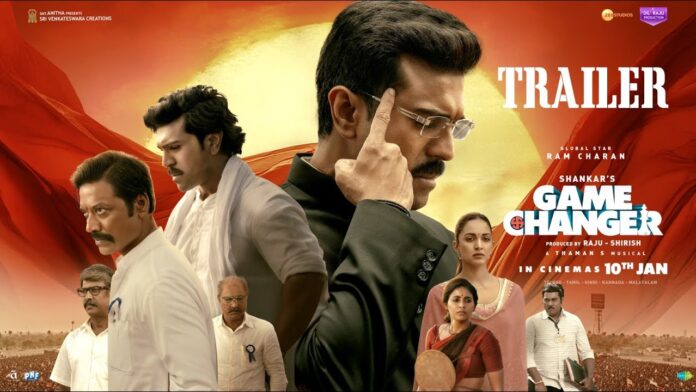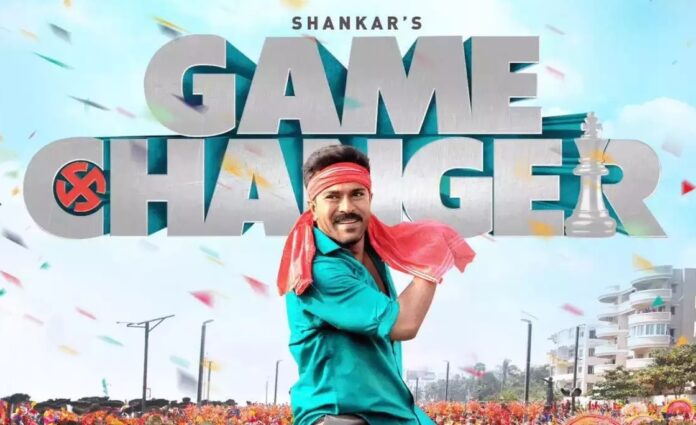Game Changer brings together the talents of Ram Charan and Shankar in what promises to be a cinematic extravaganza. The film, however, walks a tightrope between Shankar’s brand of utopian storytelling and the expectations of modern audiences. At its core, the film is a showcase of Ram Charan’s versatility, but its uneven narrative leaves much to be desired.
The plot follows Ram Charan as Ram Nandan, an IAS officer who challenges the corrupt political system led by Mopidevi (SJ Suryah) and Manikyam (Jayaram). Along the way, Ram dons multiple hats—a young lover, a reformer, and a revolutionary. Shankar’s hallmark style of larger-than-life protagonists is evident here, with Ram Charan delivering a magnetic performance that keeps the film afloat despite its flaws.
Shankar’s Signature Touch: Utopia Over Logic
Shankar is known for crafting utopian heroes who redefine societal norms, and Game Changer is no exception. In this film, Ram Nandan’s actions, whether eradicating corruption or changing public opinion, feel almost effortless. One signature on a paper, and a corrupt official is ousted. One inspiring speech, and an entire village changes its voting behavior.
While these moments are engaging, they stretch believability. Shankar’s penchant for instant justice, though entertaining, clashes with the audience’s growing cynicism. After decades of similar narratives in his filmography, the concept feels less revolutionary and more repetitive.
Ram Charan’s Stellar Performance
Despite the film’s uneven pacing, Ram Charan’s performance stands out. As Ram Nandan, he exudes charm, intensity, and vulnerability, bringing depth to a character that otherwise risks being one-dimensional. The dual roles he plays in the film, as Ram Nandan and a flashback character, showcase his range and dedication.
Kiara Advani as Deepika also delivers a commendable performance. Her character, far from being a mere support system, has impactful moments that shape the narrative. Anjali, though underutilized, brings gravitas to her role, while SJ Suryah’s Mopidevi is menacing but lacks the depth to make the conflict memorable.
A Mishmash of Themes and Arcs
The film attempts to juggle multiple themes—corruption, love, bureaucracy, and justice—but struggles to tie them together cohesively. The romance between Ram Nandan and Deepika starts strong but is sidelined midway, only to resurface abruptly. Similarly, the flashback sequences, while impactful, are rushed and fail to leave a lasting impression.
The narrative also suffers from pacing issues. Shankar crams in numerous subplots and dramatic moments, which dilute the overall impact. The emotional weight of certain sacrifices is lost in the shuffle, making it hard for the audience to connect with the characters.
Technical Brilliance Meets Writing Flaws
Technically, Game Changer is a visual treat. Tirru’s cinematography elevates the film, capturing the grandeur of Shankar’s vision. Thaman’s background score is another highlight, adding energy and emotion to pivotal scenes. The action sequences, though over-the-top, are choreographed with flair and keep the audience engaged.
However, the film falters in its writing. Shankar’s attempt to blend his trademark style with contemporary storytelling results in an identity crisis. The dialogues, which are impactful in parts, become verbose and repetitive, especially in the climactic sequences.
Missed Opportunities
Several talented actors are underutilized, including Naresh, Achyuth Kumar, and Sunil. The latter’s character has an intriguing trait that is treated as comedic relief in one instance but demands empathy in another, creating a jarring inconsistency. These missed opportunities prevent the film from achieving its full potential.
The family dynamics, too, are clichéd. For instance, Ram’s mother’s concern about his marital status feels outdated and adds little to the narrative. Such moments detract from the film’s ambition of delivering a powerful message.
The Dilemma of Shankar’s Vision
Shankar’s legacy as a filmmaker who challenges norms is undeniable, but Game Changer highlights his struggle to adapt. The film feels like a patchwork of ideas, some of which resonate while others fall flat.
His decision to cater to both his loyal audience and contemporary tastes leads to a lack of focus. The film’s final act, which should have been its strongest, veers into outlandish territory, undermining the goodwill it had built up earlier.
Verdict
Game Changer is a film that rests heavily on Ram Charan’s shoulders, and he delivers a performance that keeps the audience invested. While Shankar’s vision and technical brilliance shine in parts, the inconsistent writing and lack of cohesion prevent the film from being truly transformative.
For fans of Shankar and Ram Charan, Game Changer offers moments of brilliance but ultimately falls short of its ambitious title. It’s an entertaining watch but not the revolutionary cinematic experience it aspires to be.



